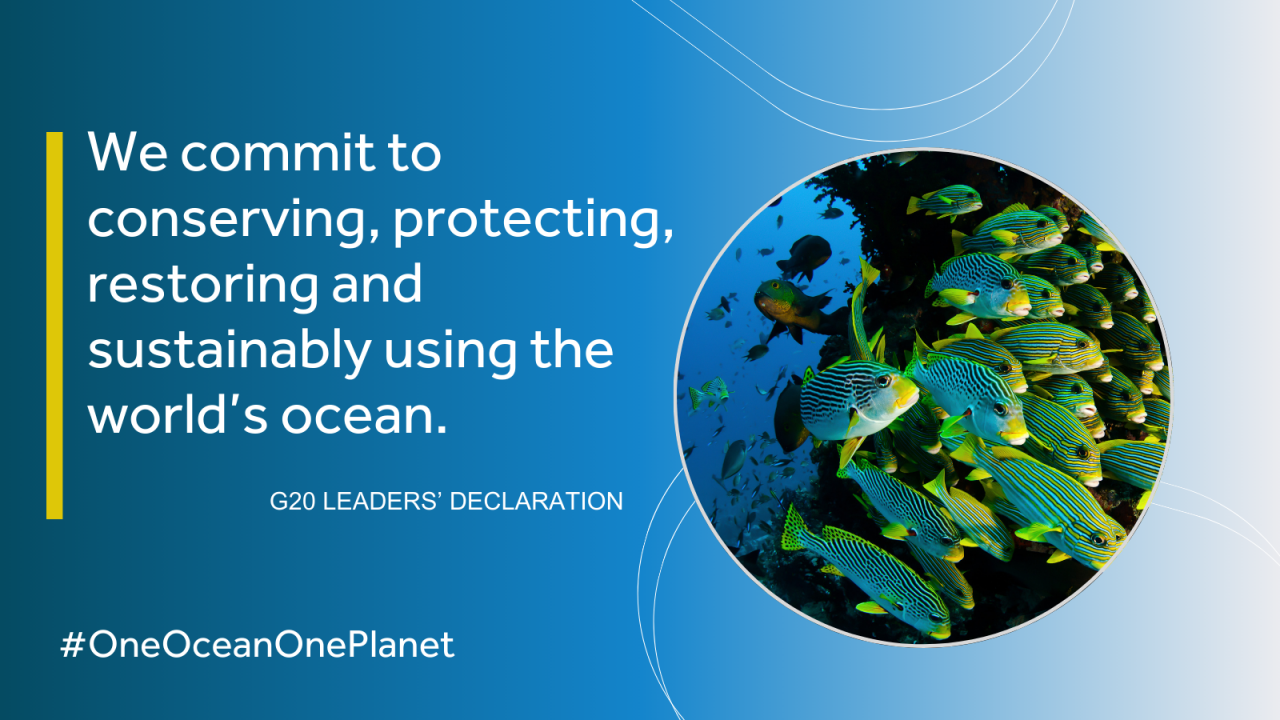The OneOcean Flotilla is encouraged by the level of prioritization towards critical ocean action in the G20 Leaders’ Summit Communiqué released on 11 September by G20 Leaders, following two days of meetings in New Delhi, India. The 37-page Communiqué outlines several key actions to tackle the climate and biodiversity crises, however, to fully safeguard our ocean for current and future generations, significant progress remains.
With the dual biodiversity and climate crises knocking on our door, the ocean cannot be placed on the back burner. The ocean is essential for stabilizing our climate, providing food, supporting livelihoods, and being home to countless species, many of which are still to be discovered. As the 20 richest countries in the world, we need bold action on behalf of the G20,”
said Travis Aten, coordinator of the OneOcean Flotilla that published a letter signed by 21 NGOs to G20 ministers last week, calling for increased focus on ocean action.

As this was the first time that G20 states met as a collective post the adoption of the Kunming-Montreal Global Biodiversity Framework in December 2022, G20 leaders reaffirmed their support and drive to implement the framework, with specific reference to deliver on the 30by30 target. It also highlighted the need for enhanced financial resources from all sources to halt and reverse biodiversity loss by 2030 and welcomed the establishment of the Global Biodiversity Framework Fund within the Global Environment Facility.
With the adoption of the High Seas Treaty in June 2023 following over 15 years of negotiations, the treaty now moves to the ratification process, requiring 60 countries to ratify before coming into force. The upcoming United Nations General Assembly provides an opportunity for countries to begin the ratification process. In a positive sign towards ratification, the G20 Communiqué urged “all countries for its early entry into force and implementation” to ensure the conservation and sustainable use of biodiversity in areas beyond national jurisdiction.
The G20 echoed their support for the establishment of a representative system of marine protected areas in Antarctica through the Commission for the Conservation of Antarctic Marine Living Resources (CCAMLR), following years of deadlock at the international body and increased calls to protect an area of the world that is affected by climate change twice as fast as others.
Disappointingly, despite support for bolder measures by some G20 members and strong references within the G20 Environment and Climate Ministers’ Communiqué, the G20 Leaders did not yet collectively support a moratorium for deep-sea mining, a controversial new industry or prohibit bottom trawling on seamounts and other vulnerable marine ecosystems. With the deep sea being one of the least understood and explored environments on Earth, G20 countries must commit to taking a precautionary approach to activities that could impact deep-sea biodiversity.
The Communiqué reaffirmed the G20’s commitment to ending illegal, unreported, and unregulated fishing, including destructive fishing methods. Furthermore, G20 Leaders signaled their determination to end plastic pollution, welcoming resolution UNEP/EA.5/Res.14 that established an “Intergovernmental Negotiating Committee to develop an international legally binding instrument on plastic pollution, including the marine environment” with the goal of completing its work by the end of 2024.
As the fate of the ocean and climate are inextricably linked and with G20 countries accounting for 80% of global greenhouse gas emissions, the G20 agreed on a goal to triple renewable energy capacity by 2030 globally. However, there was no reference to the phasing out of oil and gas in the Communiqué, with Leaders only agreeing to “phase down” coal. Sharp reductions in all types of fossil fuels are essential if the world is to keep global temperatures under 1.5 degrees.
The OneOcean Flotilla and the world now look to the G20 to hold to their commitments. As influential countries with a collective agenda to tackle these global challenges, the G20 must take leadership to propel progress nationally and in other regional and international fora,”
concluded Aten.
Notes to Editor
- Link to G20 Leaders’ Communiqué: https://www.g20.org/content/dam/gtwenty/gtwenty_new/document/G20-New-Delhi-Leaders-Declaration.pdf
- The OneOcean Flotilla is The OneOcean Flotilla is a collective of marine organisations, seeking to influence ocean protection through aligned, impactful communication. Informed by the work of scientists and other experts, the initiative provides a unified platform for ocean groups. https://www.oceanprotect.org/
- Link to joint OneOcean Flotilla NGO letter sent to G20 Leaders: https://www.oceanprotect.org/g20-leaders-summit/
